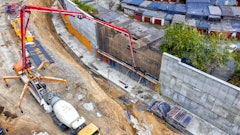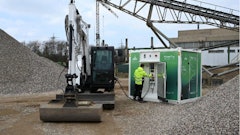Interview by Jonathan Sweet
With the end of the year approaching, it’s time to make sure you have everything in order for the tax season. Concrete Concepts talked to Russell Wolff, CPA, with Virchow, Krause & Company, LLP, one of the nation’s largest accounting firms. Wolff specializes in tax services for the construction industry.
What tax law changes do contractors need to be aware of this year?
The American Jobs Creation Act was enacted in October of 2004 and contained a provision known as the “domestic production activities deduction.” When fully phased in, taxpayers will receive a deduction equal to 9 percent of the lesser of qualified production activity income (QPAI) or taxable income. The applicable percentage is 3 percent for 2005.
QPAI is defined as domestic production gross receipts less cost of goods sold, costs directly allocable to the receipts and a ratable portion of indirect costs. For most small contractors, the deduction will be the appropriate percentage (3 percent for 2005) of taxable income. It should also be noted that the deduction is limited to 50 percent of the W-2 wages of the taxpayer for the taxable year. This could be an issue for small contractors that do not have employees, such as a sole proprietorship. All contractors should be reviewing this provision to make sure they maximize their deduction.
Also, many contractors have taken advantage of the bonus first-year depreciation allowance that existed for the past few years. This provision expired on Dec. 31, 2004. This will have an impact on the amount of tax depreciation expense that may be available for 2005. Proper planning can help mitigate the impact of this expired provision.
Are there any changes scheduled for 2006 and beyond that they should take into consideration?
Thus far in 2005, we have had the Energy Tax Incentives Act of 2005 and the SAFE Transportation Equity Act of 2005. The provisions of these acts do not directly relate to concrete contractors, but for business owners new provisions will provide tax incentives for energy-efficient improvements to new or existing buildings. If you are anticipating improvements to an existing building or constructing a new facility, review these provisions to see if tax incentives are available. I would also mention that on Sept. 9, the IRS increased the standard mileage rate to 48.5 cents per mile. This could provide enhanced deductions for vehicles for the later part of 2005.
What steps can contractors take to lower their taxes before the end of the year?
Contractors should review their method of accounting periodically to make sure they are minimizing tax. The construction industry has unique accounting method issues. Small contractors have a wide range of methods to choose from. Review your method with your tax adviser. If a change is beneficial, action may be needed before year-end. Otherwise, review income and expense items as you approach year-end. Properly deferring income or accelerating expenses may reduce the tax bite for 2005.
Equipment acquisitions should be reviewed. Each year a taxpayer is allowed to write off a certain amount of equipment purchases. This write-off eliminates the need to depreciate the asset. For 2005 the amount that can be written off is $105,000. Part of year-end planning should include a review of this provision to determine if additional equipment purchases could reduce taxable income for 2005. A change in the tax law last year limits the benefits of this provision to $25,000 for certain SUVs.
What can contractors do to address some common mistakes?
Review payments to independent contractors. The IRS reviews these payments to make sure the individuals receiving payments are not employees. How workers are classified for tax purposes has major tax consequences. You need to look at the degree of control the company has over the worker. If the company can control what will be done and how it will be done, the worker may be classified as an employee.
A lot of our readers have home offices. What steps do they need to take to make sure they are eligible for the home office deduction?
A deduction for a home office is available if it is used on a regular and exclusive basis for business. Review with your tax adviser whether the “regular and exclusive” test is met. Also calculate the potential benefit before deciding to claim the deduction. This deduction would include depreciation expense on the home. Taxpayers should consider that this depreciation will be taxable if the home is sold later. This is a legitimate deduction and is often overlooked.
As our readers look to next year, what are some of the things they can be doing throughout the year to lighten their tax burden?
The tax planning that is done for 2005 should consider the tax picture for 2006. For example, if taxable income is expected to be large in 2006, it actually may be beneficial to accelerate income into 2005 and pay tax at a lower tax rate. The same strategy applies for deductions and equipment purchases.
Why should contractors work with a professional tax adviser?
The tax adviser will assist in interpreting the many tax provisions that will impact the contractor’s tax liability. The adviser should also provide valuable planning in areas such as the type of entity for the business and succession planning.
When choosing a tax adviser, what are some of the things a contractor should look for?
The adviser should be focused on the construction industry. The adviser that specializes in the construction industry is better equipped to advise on the tax issues that relate to the industry. Additionally, choose an adviser that you are comfortable with. Talk with people in your industry to see who they use.



























